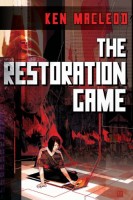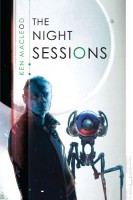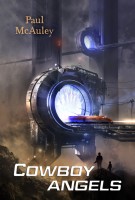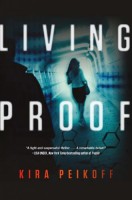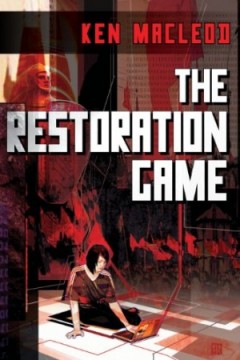
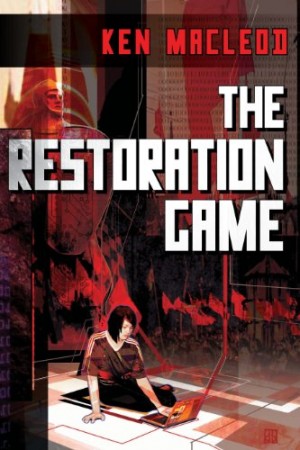
Having never read a Ken MacLeod novel before, I found my introduction to him to be a bit rocky. The opening chapters of The Restoration Game were replete with irritants. After that it settled down and started to tell an interesting story, but never quite managed to completely convince. It had the right ingredients for a better tale, but it could not get the doses right and wound up feeling, for all its positive points, out of balance.
The story’s protagonist, Lucy Stone, spent most of her childhood in the fictional Soviet Republic of Krassnia, but now works for a computer game company in Edinburgh. Her company is hired to make a Krassnian version of a popular medieval computer game, and her heritage and lingual abilities, rare to be found in the West, are the reason her company was chosen. There is more to this request for a Krassnian video game than is initially apparent, however. Lucy’s mother is a former CIA operative, and another man who might be her father is mired in the same kind of political intrigue. Through them Lucy gets entangled in an international plot the details of which are murky but the danger in which becomes increasingly apparent. Finally, she finds herself on a mission with consequences so far reaching that “epic” does not seem to do them justice.
[continue reading…]
Help Promote Prometheus Unbound by Sharing this Post


Nominations are now closed for our June read. It’s time to vote on the book we’re going to read next month.
Here are the candidates:
Shadow and Claw is comprised of the first two books of Gene Wolfe’s four-volume The Book of the New Sun (1980–83), which is a critically acclaimed work of far-future science fantasy in the Dying Earth tradition of Jack Vance. The Shadow of the Torturer is the tale of young Severian, an apprentice in the Guild of Torturers on the world called Urth, exiled for committing the ultimate sin of his profession — showing mercy toward his victim. The Claw of the Conciliator continues the saga of Severian, banished from his home, as he undertakes a mythic quest to discover the awesome power of an ancient relic, and learn the truth about his hidden destiny.
Farnham’s Freehold by Robert Heinlein — It’s a cross-time fight for freedom as a family retreats to a bomb shelter during a nuclear attack — only to emerge hundreds of years in the future, thrown forward in time by the blasts. There lifeboat ethics rule as they struggle to survive … until they’re discovered by up-time humans, the survivors of the apocalypse. These survivors are of African descent. Down-time humans — in fact, all of the European-descended — are held guilty for the state into which the world has fallen and designated as automatic slaves. The only escape is to find a way back down-time, to change events sufficiently to make absolute certain this nightmare future never get a chance to happen in the first place!
The Freedom Maze — Delia Sherman’s young-adult fantasy novel focuses on an adolescent girl of 1960 who is magically sent back in time to 1860 when her family owned slaves on a Louisiana plantation. With her summer tan, she’s mistaken for a slave herself, and she learns the hard way what life was like. In the process, she comes to appreciate the values of honor, respect, courage, and personal responsibility.
Ready Player One — Ernest Cline’s genre-busting blend of science fiction, romance, suspense, and adventure describes a virtual world that has managed to evolve an order without a state and where entrepreneurial gamers must solve virtual puzzles and battle real-life enemies to save their virtual world from domination and corruption. The novel also stresses the importance of allowing open access to the Internet for everyone.
Snuff — A Discworld novel by Terry Pratchett (winner of a Prometheus Award for Night Watch, also set in Discworld), Snuff blends comedy, drama, satire, suspense and mystery as a police chief investigates the murder of a goblin and finds himself battling discrimination. The mystery broadens into a powerful drama to extend the world’s recognition of rights to include these long-oppressed and disdained people with a sophisticated culture of their own.
[continue reading…]
Help Promote Prometheus Unbound by Sharing this Post
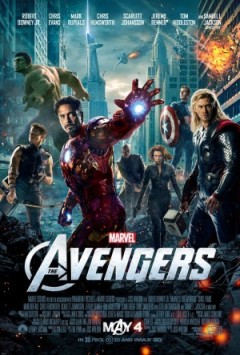
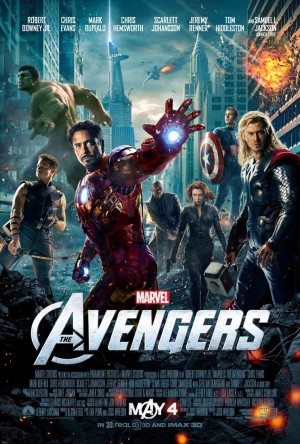
After a series of movies about individual superheroes, movies that gave us their origin stories, we have finally been treated to the culmination of the last few years and so many millions of man-hours: The Avengers. The films leading up to it were generally fair to middling, I thought, with the first Iron Man rising maybe half a skosh above that level. The latest comes heralded by uniformly positive reviews. It is, we are told, much better than one would expect. According to most reviews, there is a greater focus on character than one usually gets in an action movie, but there is no skimping on set pieces. The reality, for me, was more of the same: half a skosh above decent.
Loki, Thor’s brother and fellow god, wants to rule the Earth. He makes a deal with some aliens who agree to conquer the Earth for him in exchange for the Tessaract, an artifact of immense power, which will also play a role in transporting the invading army to New York to begin the takeover. Loki steals the Tessaract from Nick Fury, who then assembles the Avengers to find him, find it, find out what the plan is, and do anything else that needs a little superpower elbow grease. A lot of bickering between incompatible personalities and a whole lot of violence and destruction ensue.
The plot is unremarkable but perfectly adequate, and that is a good description for the movie as a whole. There are no scenes whose impact lingers in your memory after the credits have rolled, no wonderful development of character, no stunning visuals, no lines of great insight, no “aha!” moments. What it does have, to go with its serviceable story, is competent direction, a few genuinely amusing visual jokes, a bevy of one-liners that play well to an opening-weekend audience, and the action set pieces that many movie goers — mostly male — crave sometimes to the exclusion of all else.
[continue reading…]
Help Promote Prometheus Unbound by Sharing this Post
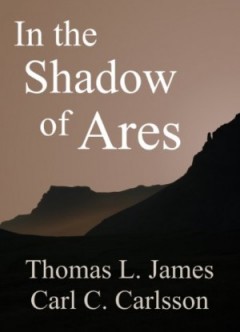
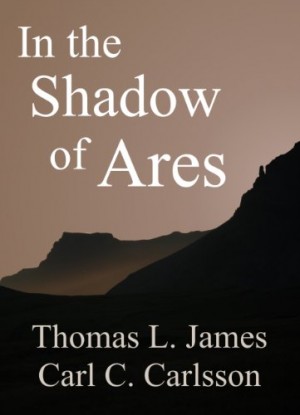
The first Lightmonthly Read hosted by Prometheus Unbound has begun!
For the month of May we will be reading and discussing,
In the Shadow of Ares (Kindle, Nook) — This young-adult first novel by Thomas L. James and Carl C. Carlsson focuses on a Mars-born female teenager in a near-future, small civilization on Mars, where hardworking citizens are constantly and unjustly constrained by a growing, centralized authority whose excessive power has led to corruption and conflict.
It appears to be available only as an ebook, so there’s no need to worry about delivery times. You can download your copy today and start reading right away. If you don’t own a Kindle or a Nook, there are free Kindle and Nook reading apps available for almost all major platforms.1
Join us as we read and discuss In the Shadow of Ares.
[continue reading…]
Help Promote Prometheus Unbound by Sharing this Post
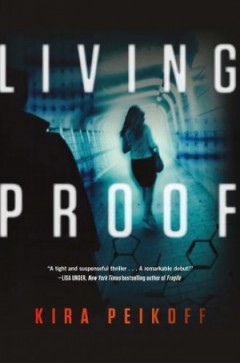
In the interest of full disclosure, here are the books we received in April.
Yes, that’s prominent Objectivist Leonard Peikoff’s daughter.
Help Promote Prometheus Unbound by Sharing this Post

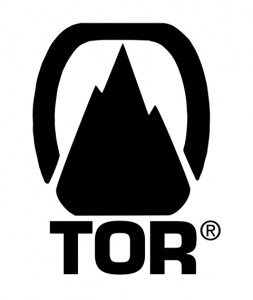
It’s been a news-heavy month. Here are a few more tidbits:
- Yesterday, Tor/Forge announced that it will make all of its ebooks completely free of DRM by early July 2012. This is a momentous and welcome change. Tor/Forge is a genre imprint of Macmillan, one of the Big Six publishers. It’s the first of these publishers to cave to author and cusotmer pressure on DRM. It may have helped that Macmillan is not a publicly traded company. Cory Doctorow believes more Big Six publishers are sure to follow; he’s “had contact with very highly placed execs at two more of the big six publishers.”
- Last month, James Cameron promoted private deep-sea exploration. He’s also partnered with Google’s Larry Page and Eric Schmidt, and Ross Perot Jr., to back private space company Planetary Resources. Immediate plans are to design and build low-cost robotic spacecraft for survey missions. The firm, founded and chaired by Peter Diamondis (creator of the X-Prize Foundation) and Eric Anderson, hopes to then build on this technology and begin mining Near-Earth Asteroids (NEAs) within the next ten years. For an extended explanation of how and why Planetary Resources can succeed, read Phil Plait’s post on the Bad Astronomy blog. We live in exciting times for the exploration and exploitation of space.
[continue reading…]
Help Promote Prometheus Unbound by Sharing this Post
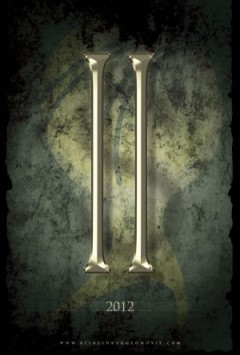

Brian Doherty of Reason.com was able to visit the set of Atlas Shrugged, Part II — Either-Or, based on Ayn Rand’s inspiring novel, during part of its ongoing 31 day shoot. After poor box office sales and being panned by critics, including our own Matthew Alexander (read his review), many wondered whether the second and third installments would ever be filmed. Encouraging DVD and VOD sales convinced the wealthy “rights”-holder, John Aglialoro, to persevere and a few new Randian investors to hop on board. I’m not sure whether the budget is the same, but in a risky move two things certainly aren’t: the director and the entire cast.
Yes, you read that right. The director and the entire cast from the first film were not retained for the second and third installments. The irony is not lost on those of us who both recognize that so-called intellectual property is illegitimate and are painfully aware of how fiercely most followers of Ayn Rand cling to it that copyright appears to have played a major role in this potentially devastating turnover. As one of the producers, Harmon Kaslow, himself explains,
[continue reading…]
Help Promote Prometheus Unbound by Sharing this Post










